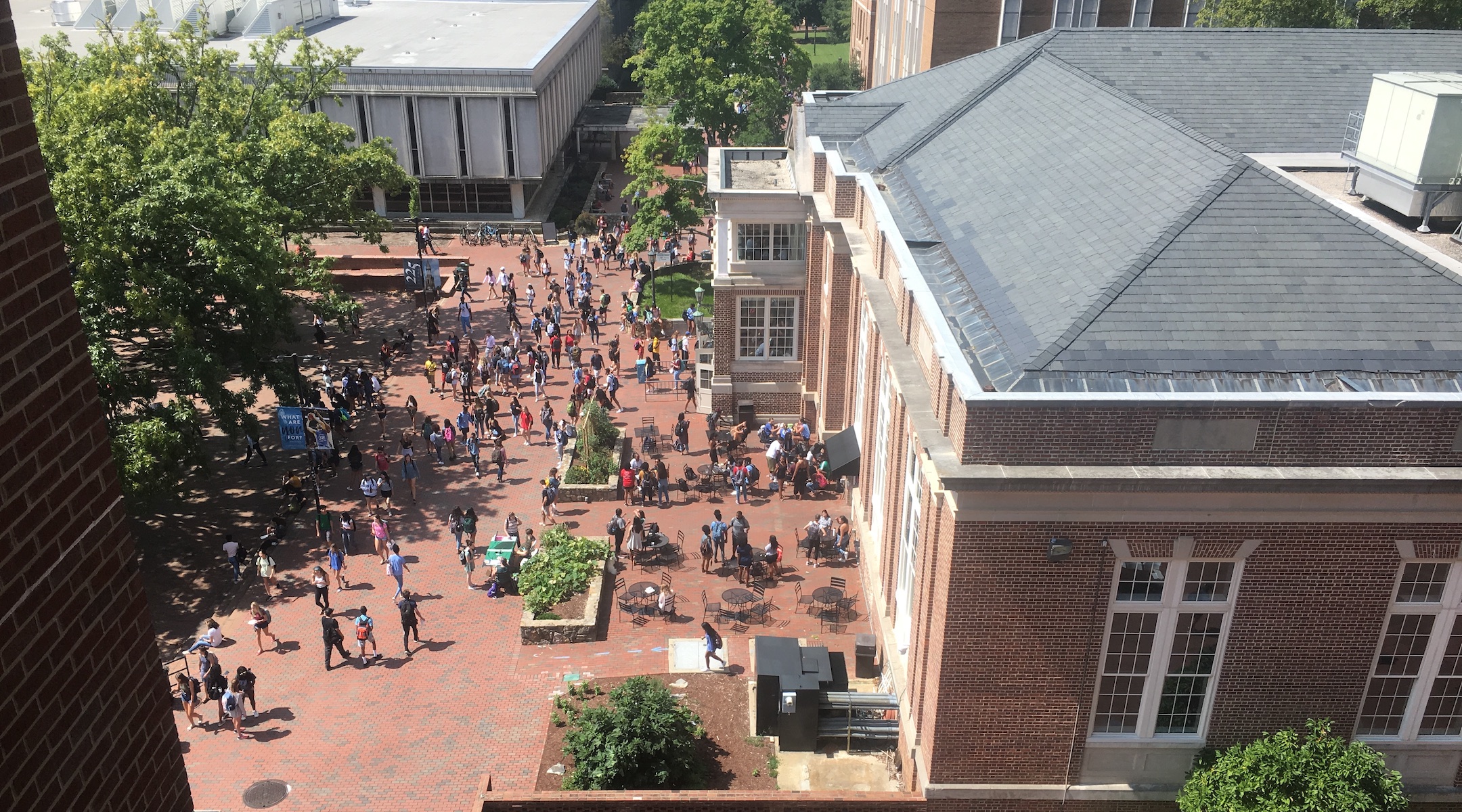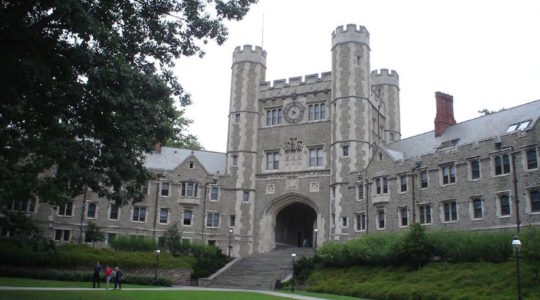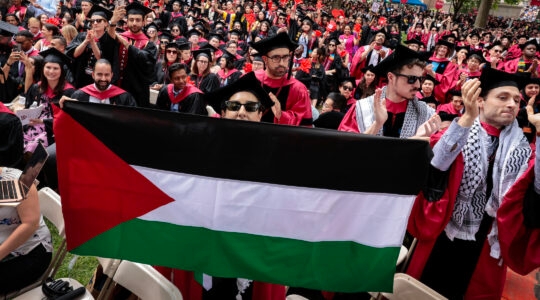(JTA) – Earlier this month, a lawyer acting on information from a pro-Israel group of North Carolinians told the federal government that their state’s flagship public university should be investigated for allowing anti-Israel rhetoric on campus.
Now the government has acted on it.
The U.S. Department of Education announced today that it has opened a new Title VI investigation into the University of North Carolina at Chapel Hill, along with two others into George Mason University and Newark Public Schools, related to complaints of mistreatment based on “shared ancestry.” The investigations round out a busy year for the department’s civil rights office, which has doubled down on antisemitism- and Islamophobia-related complaints at universities and K-12 schools since the outbreak of the Israel-Hamas war.
Although the department does not publicly reveal the reasons for any of its open Title VI investigations, a staffer confirmed in a letter viewed by the Jewish Telegraphic Agency that its UNC investigation is related to a complaint filed earlier in the month by a lawyer affiliated with a pro-Israel nonprofit in the state. A person with knowledge of the George Mason University investigation also told JTA it was related to allegations of antisemitism.
David E. Weisberg filed the UNC complaint Dec. 7, alleging that a member of the university faculty and a guest speaker on campus both made anti-Israel comments in the weeks after the Oct. 7 Hamas attacks. Reached for comment, Weisberg said that the information in the complaint came from Peter Reitzes, a board member of Voice4Israel of North Carolina, a registered 501(c)3 that posted the complaint in full online.
“UNC-Chapel Hill has fostered a hostile campus environment towards Jewish and pro-Israel students for years,” Reitzes told JTA in an emailed statement. “I hope OCR’s investigation leads to UNC providing Jewish and pro-Israel students and faculty with a safe and productive campus environment that is institutionally neutral on Israel and the Palestinians.”
Weisberg’s complaint details two incidents of alleged anti-Israel or pro-Hamas rhetoric at UNC to which he believes the administration should have responded more strongly. In the first, a Communications professor, E. Chebrolu, allegedly stated during two different classes that “Israel and the United States do not give a shit about international law or war crimes” and that Israel is “a clearly fascist state committing a genocide under the guise of it supposedly being the only democracy in the Middle East.”
In the second incident, a guest speaker at an event endorsed by two UNC departments and hosted on UNC’s campus was recorded stating that “October 7, for many of us from the region, was a beautiful day.” The speaker, Rania Masri, co-director of a North Carolina environmental group, said she would “not be in the least bit apologetic of the violence of the oppressed or the occupied,” adding, “Let us demand the eradication of Zionism.”
Hamas gunmen killed some 1,200 Israelis, mostly civilians, on Oct. 7, and kidnapped more than 200.
In a Dec. 22 letter to Weisberg, Dan Greenspahn, a staffer at the Department of Education’s civil rights office, confirmed that its investigation was related to his complaint. Greenspahn wrote that the department will investigate “whether the University responded to alleged harassment of students based on national origin (shared Jewish ancestry) in a manner consistent with the requirements of Title VI,” while noting that opening an investigation does not mean the department believes the complaint has merit.
In a statement to JTA after this story’s initial publication, a UNC spokesperson said the university “is aware of a complaint filed with the Department of Education’s Office for Civil Rights about Jewish students on campus” and that it “will cooperate fully.” A Department of Education spokesperson declined to comment on pending investigations.
In his complaint, Weisberg claims that for UNC to allow such incidents is in violation of a shared agreement the university struck with the Department of Education in response to a 2019 Title VI complaint. In that agreement, administrators agreed to respond to and investigate incidents of antisemitic harassment on campus and hold antisemitism training for staff. The case stemmed from a complaint filed by the Zionist Organization of America over a conference related to the Gaza Strip the university held jointly with Duke University. The conference featured a satirical performance by a rapper that critics said was antisemitic.
Weisberg’s complaint also alleges that UNC has a responsibility to follow the International Holocaust Remembrance Association’s controversial definition of antisemitism, which includes some forms of criticism of Israel. While the definition has been widely adopted, including by new Department of Education guidelines refined under the Trump administration, it has also been criticized by some scholars who say the definition could punish speakers for legitimate criticism of Israel. A bill introduced in North Carolina’s general assembly in April, pushing the state to adopt the IHRA definition, has not yet been signed.
Congress has taken a particular interest in UNC in its efforts to address campus antisemitism. A resolution in the U.S. Senate condemning antisemitic rhetoric on campus specifically references a statement posted on social media by the school’s chapter of Students for Justice in Palestine reading, “it is our moral obligation to be in solidarity with the dispossessed, no matter the pathway to liberation they choose to take. This includes violence.” (The statement was later deleted.)
In a statement provided to JTA, George Mason University would not say whether its own Title VI investigation involved antisemitism, although a source at the university read from a Department of Education letter confirming that it was.
The school’s statement reads, “George Mason University has a proud history of robust inclusivity that includes welcoming students, faculty, and staff from all walks of life. We do so by maintaining a safe and supportive environment to learn, teach and live while observing free speech requirements that the First Amendment demands of all public universities.
The university added that it is “confident that the Department of Education’s review will confirm that George Mason University has acted well within the letter and spirit of laws and the First Amendment.”
A JTA request for comment to Newark Public Schools regarding its own Title VI investigation was not returned.
GMU has made some headlines since Oct. 7 for antisemitism- and Islamophobia-related activities on its Fairfax, Virginia campus. The public university issued an Oct. 31 statement condemning video of someone ripping down an Israeli hostage poster on campus, as well as efforts to dox the perpetrator; the school also banned a 28-year-old man from campus for four years for allegedly passing out antisemitic flyers and deleted several student emails that were sent on a reply-all listserv criticizing the university’s perceived failure to address Muslim students’ concerns.
With these latest schools, the Department of Education looks set to round out the year with 38 Title VI shared ancestry investigations opened into colleges and K-12 schools since Oct. 7. Of those, JTA has confirmed that at least 12, and likely more, are related to antisemitism, with some of those cases referencing incidents that predate Oct. 7. Several other schools have said they were not told why they were being investigated.
Update (12/27/23): This story has been updated with information from a source about the GMU investigation.
Correction (12/27/23): An earlier version of this story inaccurately stated that the UNC complaint was filed on behalf of a pro-Israel North Carolina group. In fact, the lawyer who filed the complaint was acting off of information provided by the group but was not working on the group’s behalf.
JTA has documented Jewish history in real-time for over a century. Keep our journalism strong by joining us in supporting independent, award-winning reporting.






